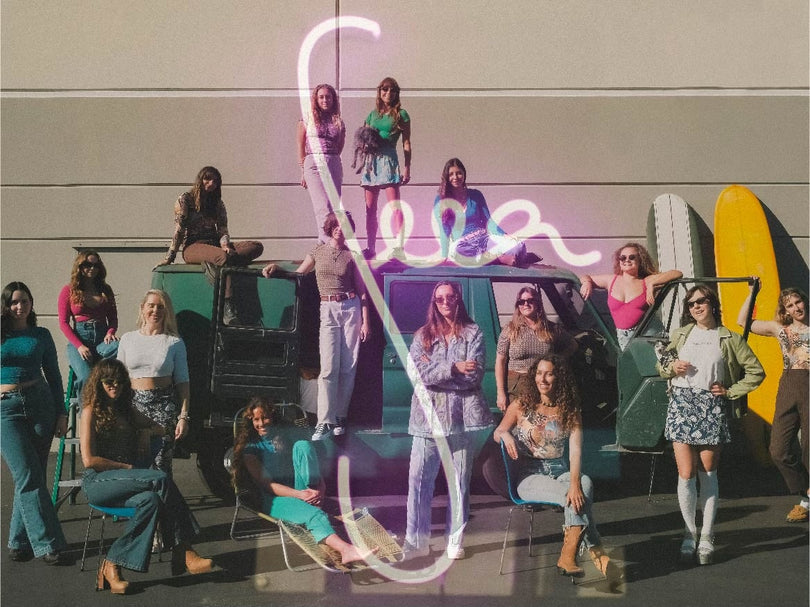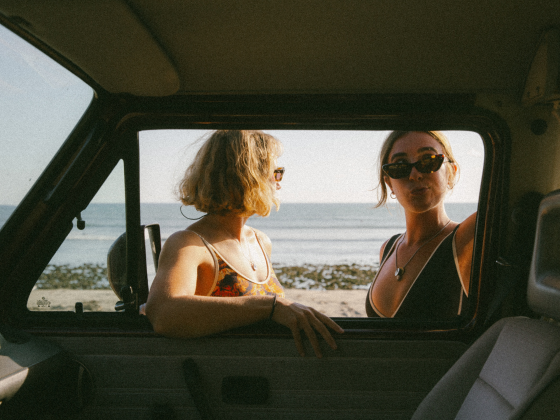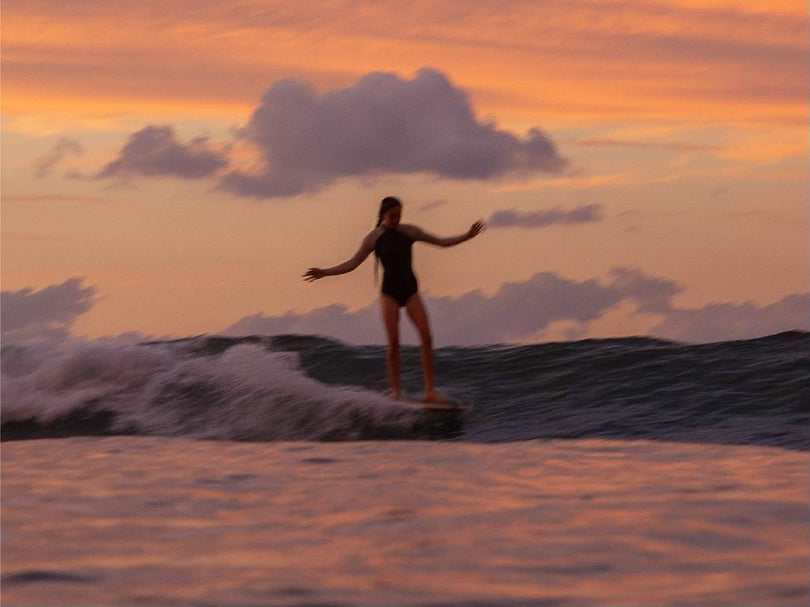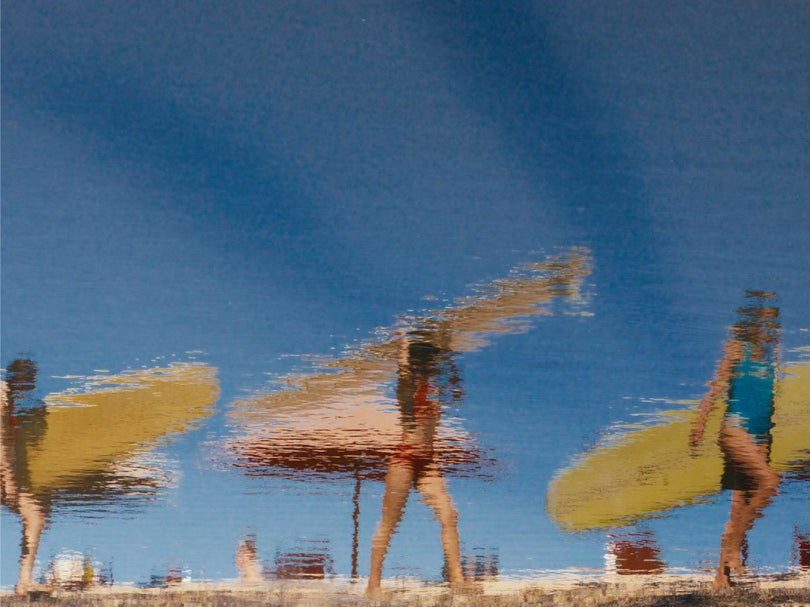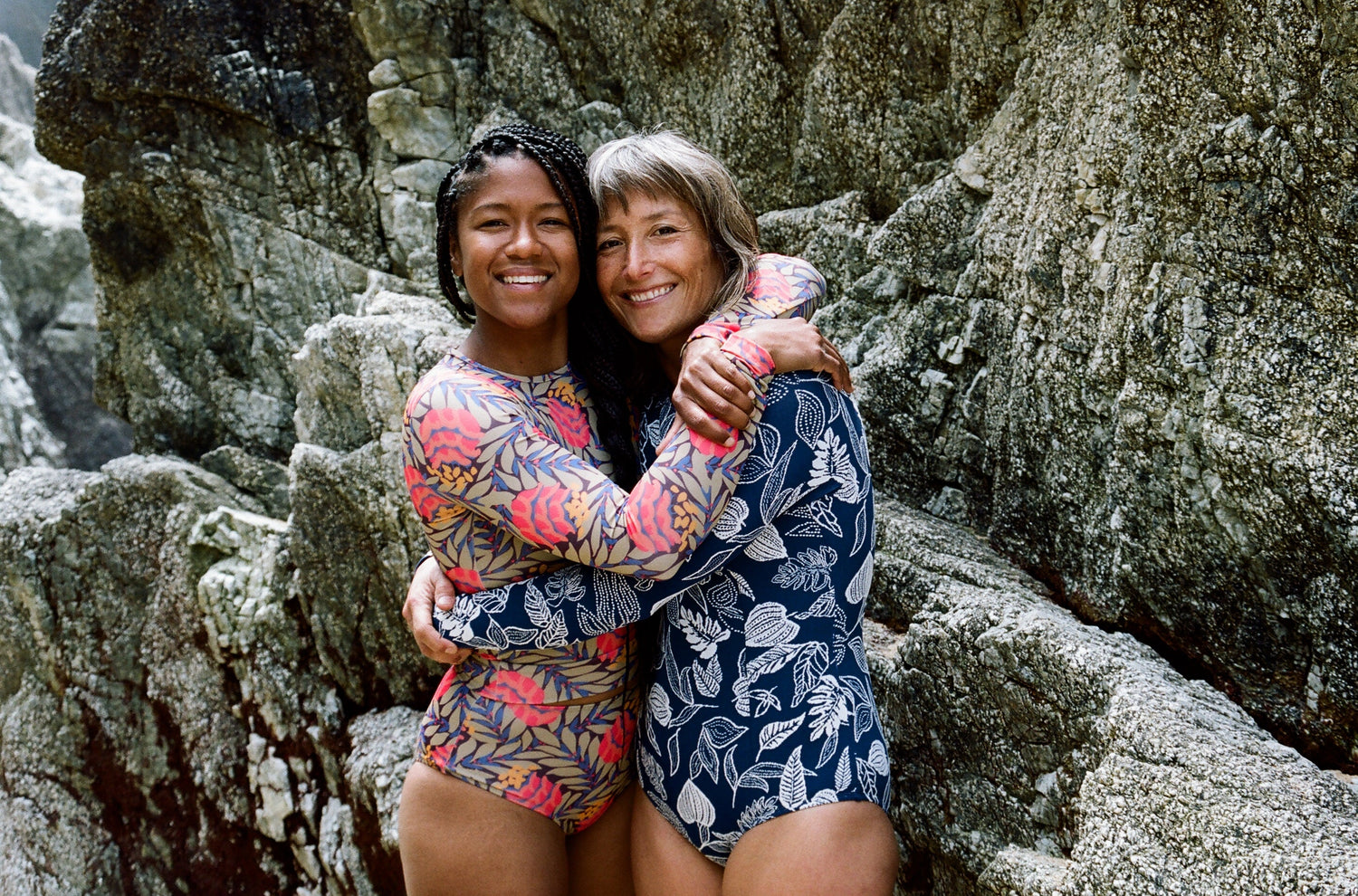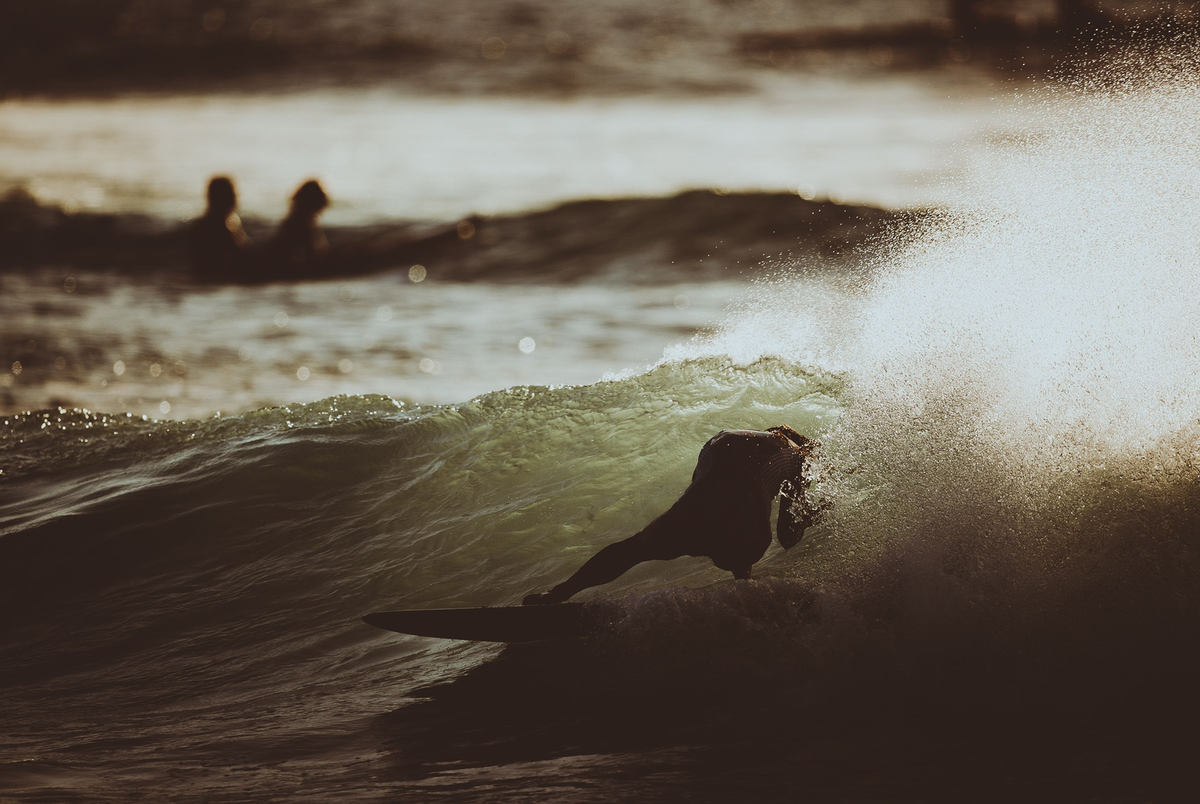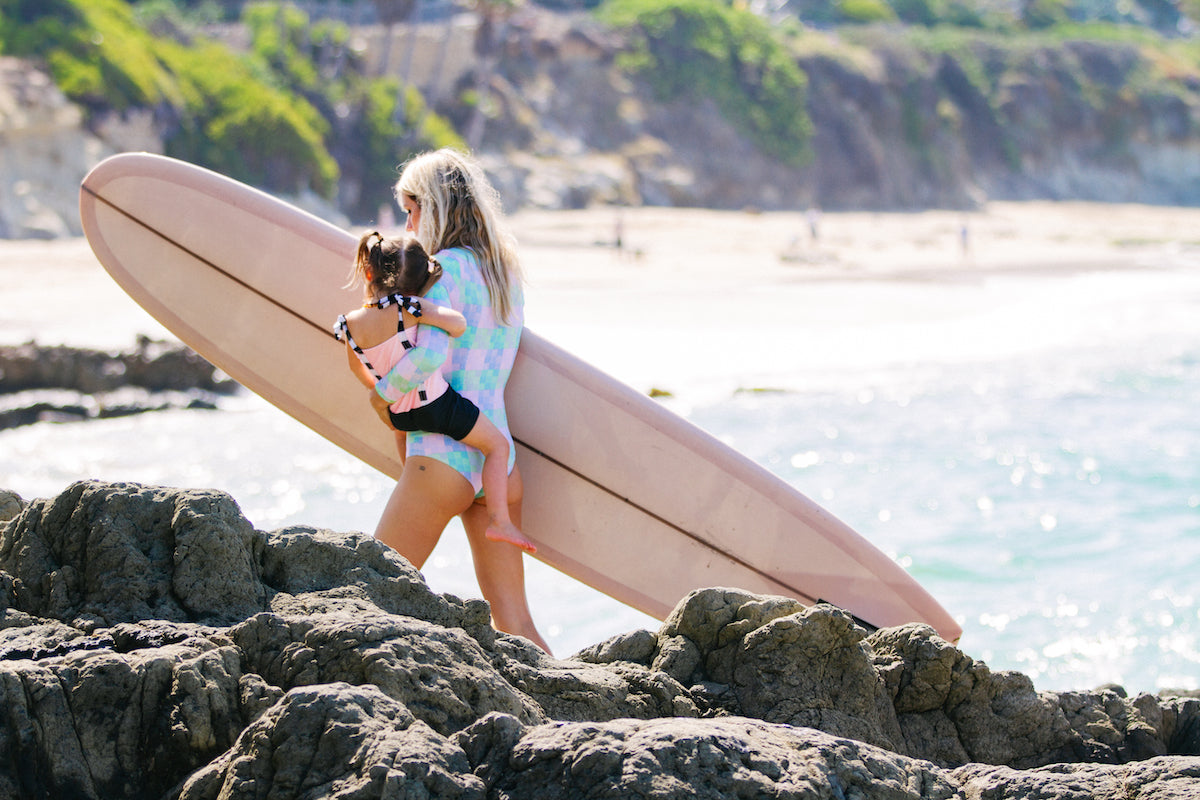Interview by: Rhea Cortado
The relationship between a photographer and a subject is akin to a surfer and a wave. Together in communication, two beings create art—a moment in time. Before photographer and filmmaker Sachi Cunningham and writer and Textured Waves co-founder Chelsea Woody became friends and collaborators, they were art enthusiasts of each other’s work.
“She's a legend around here in Northern California,” Chelsea said of Sachi. “I saw her one day and I was like, fangirling. Then hit her up on the good old IG.” Sachi added, “Chelsea introduced herself and the rest is history. She amazes me. I’ve loved watching her blossom not only as a surfer but also as a filmmaker, writer, creative director, casting director, actor, stunt double, and model. There’s nothing Chelsea can’t do and she’s just getting started!”
The two immediately connected over common threads and a shared understanding of the icebergs below their stories. They are both hapa (Chelsea’s mother is Black and her father is Thai, Sachi’s mother is Japanese and her father is white), surf the same spots in central California, and are purposeful in expanding dominant surf culture narratives.

As one of the co-founders of Textured Waves and co-director, producer, and writer of "Sea Us Now,” Chelsea illuminates the stories of Black women surfers of the past and present. She’s represented Black women surfers as herself on rarely-before-seen mainstream media stages from major global brand collaborations (one currently in Times Square!), to being a TV stunt double for a groundbreaking Canadian TV series called “Diggstown,” and in The New York Times. Chelsea is a Registered Nurse and a Global Ambassador for Vans Surf and first African American woman to represent Vans Surf.

Sachi, a filmmaker and professor of multimedia journalism at San Francisco State University, has been documenting top female big wave surfers over the course of 20 years, and in the last 8 years has been documenting Bianca Valenti, Keala Kennelly, Paige Alms, and Andrea Möller and their quest for gender pay equity and access to equal contest opportunities. Their hard won victory was catalyzing equal pay for all women competing in the World Surf League in 2018—the first US based sports league in history to do so. This is already bearing fruit in the next generation of elite women surfers.
I caught up with Sachi and Chelsea about their creative process together, the importance of creating community, and telling their own stories.

Rhea Cortado: When I started surfing when I was around 29, I immediately rearranged my entire life to surf more. I was like, ‘I'm going to get a board. I'm going to get a wetsuit and wake up at five o'clock in the morning and drive an hour to the beach before work in L.A.’ It literally became an addiction. Could you describe what attracted you, and attracts you to the ocean and why?
Chelsea Woody: It’s feeling like we are water — going back to our natural selves and being connected to this powerful force of nature. There's something freeing about being in the ocean. It makes you feel like you can do almost anything. It sounds so silly, but the weightlessness and defying gravity makes you feel limitless. And it does become an addiction. I mean, my husband and I uprooted our whole lives to move to Santa Cruz so we can surf every day. We couldn't live without it. What keeps me coming back is trying to replicate that feeling of happiness, this pure feeling of joy, that I don't think I've ever really experienced doing another activity.
Sachi Cunningham: I was just thinking about the weightlessness. Very directly and metaphorically, it's like you are lifting the weight of all of those trappings on land. You feel that immediately and you feel like a superhero. You’re transported to another world. I was a competitive swimmer from 7 years old to 21. Bonnie Tsui wrote a wonderful book called “Why We Swim” which beautifully describes the joy of swimming and being in a body of water. The ocean for me — it's that reminder that there is something greater than yourself that you can escape to or be powerful in. Every wave is different and we have the freedom to surf it however we want. It unleashes creativity and is a direct communication with nature.
Rhea Cortado: What are some of the feelings or experiences that you've been able to process through surfing?
Chelsea Woody: There have been so many feelings I have been able to process through surfing. Getting back into the ocean with Sachi after I had suffered traumatic loss a couple of years ago, was so cathartic. Having the ocean during that time was a way to escape. It was a way to process, it was a way to be creative, and work through a traumatic time. I don't know what I would have done without having that outlet of surfing and having my new friendship with Sachi, who also helped me to process and go through that really challenging time.


Sachi Cunningham: If I don't get in the water, I am a mess. I also rearranged my life so I could be by the ocean. I have taken lithium in the form of a pill for the last almost 30 years because of a bipolar one diagnosis that I got when I was hospitalized at 19 years old. Lithium exists in the ocean. There's this body of lithium, right on my doorstep that I can dive into and soak in that has had a powerful effect. This “vitamin sea” is also a form of meditation.
Swimming in big waves has been transformative for me. It’s a physical strength that you develop, a muscle memory that translates directly into how you carry yourself and live on land. When I had cancer, it certainly helped. I already had this practice of watching these dangerous waves come to me that could kill me (like cancer), but staying calm in those moments through diving under and surviving, and trying to make beauty out of those moments through my images — I developed a muscle memory for resilience.
Rhea Cortado: You have a personal relationship as friends and a working relationship of collaborating on creating stories and visuals together. Tell me a little more about that dynamic.
Sachi Cunningham: Developing a creative relationship with Chelsea has been very special. Surfing and photography are ultimately solo pursuits, but when one plus one can equal three, that’s the magic I live for. There are also certain surfers whose dance moves to the same beat as mine. Chelsea is one of them. It’s been very easy and organic. I think knowing how important Chelsea’s mission is to change the visual narrative of surf culture has also helped frame our collaborations. She’s often in the driver’s seat creatively, which is not always the case in my work, but I love and welcome it. As a professor I teach, but the real reason I stay in the job is because I’m constantly learning from my students. Chelsea is my teacher and I’ve learned so much from working with her. It has also helped that we trust and respect each other, and have a similar sense of humor and perspective on the world.
Chelsea Woody: I cherish our friendship deeply and it has really helped in our creative process as well because we tend to hold each other accountable. When I paddle out with Sachi I feel like I can do anything and I feel really comfortable being myself with her. She doesn’t have unrealistic expectations of my surfing. Recently, we have been going out at Ocean Beach which is a really intimidating place, but her confidence in my ability to push my limits is contagious.
Rhea Cortado: Both of you share a common purpose in social activism and social justice. I feel like there is a dissonance between the surf industry and some mainstream media representations of surfing that doesn’t reflect the huge range of surfers and perspectives in the surf community. Something I admire about the work you’re both doing is that the paradigm shifts that you’re making visible in the community is pushing the industry to change too. What are your metrics for success in this arena? Are there any tangible moments where you feel like change is happening?
Sachi Cunningham: I remember four or five years ago when I met Izzy Gomez at the Big Wave Risk Assessment Group (B.W.R.A.G.) training in Oahu. I literally teared up seeing this young elite athlete (a five-time SUP world champion) eagerly and methodically doing the work needed to surf big waves. “It's happening,” I thought to myself. The number of women competing in the Red Bull Magnitude also reflects this change. I know now that there is equal pay in the WSL, that it is an Olympic sport (and we have a gold medal to defend!), and contests are streamed around the world. There is no question that change will come at a faster rate than in the past, but it will take a village and vigilance! There’s still a long way to go until diversity is part of the mainstream fabric of surf culture.
Chelsea Woody: For me, we are currently witnessing active change. Seeing brands support diversity initiatives and share our stories is a start. Just to be invited to take part in some of this winter’s North Shore events is change. It was interesting to see first hand exactly how insular these spaces are — change will only continue if the door is propped open. Witnessing Sachi out there documenting the Da Hui Backdoor Shootout, watching Moana Wong and all these women charging felt very significant and you could palpate the excitement from the crowd. The first time I ever saw surfing was watching Blue Crush when I was 17, which was 20 years ago. It has taken that long for Black women to be given a seat at the table in surfing and for women to be invited to compete in the Da Hui. That's huge. All the momentum we see with change right now is being propelled forward by the work of women that came before us, we just have the ability to use our own media platforms to be seen.

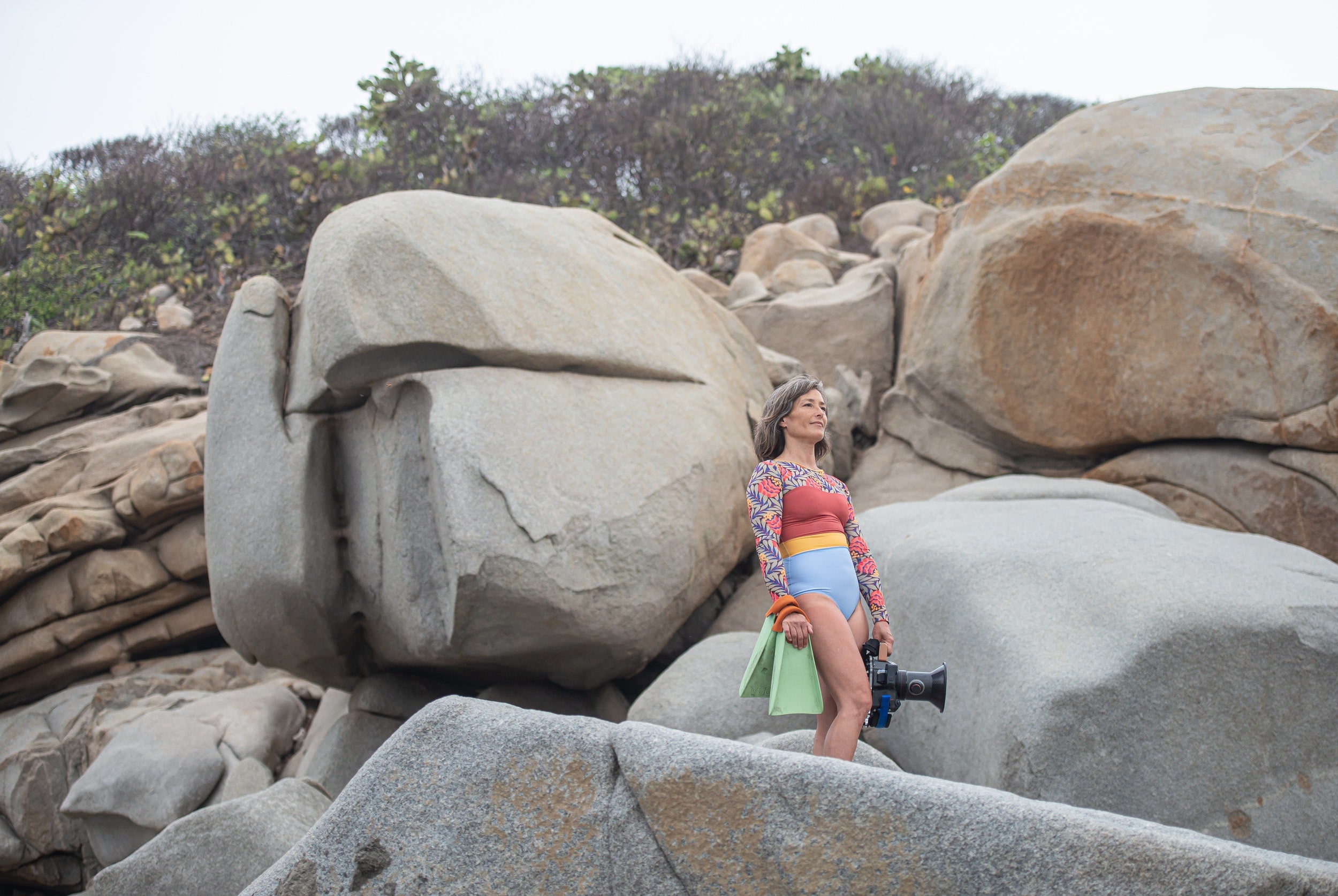
Sachi Cunningham: When I was shooting Moana Wong getting barreled — and the first ever women's heat with superstars Bianca Valenti, Keala Kennelly, Bethany Hamilton competing — I literally was crying when I was shooting. I'm crying right now. It's crazy. That's how real it is. We are witnessing seismic change. I did the math, and the first time I shot from the water at Pipe was 25 years ago. Twenty-five years is what it took to see women have their own space in that lineup. I hope, I tried, to play a role in that. But if there were more of me, if Chelsea had been doing this 25 years ago, it'd be a whole different landscape. I'm ready. It's happening. The goal is for there to be a time when we’re not knocking on the doors, but being invited in.


Chelsea Woody: Textured Waves was created because we wanted to see what we had not seen as children. It was created around the idea that if no one was going to show Black and brown women in surfing — well, we're going to create a space where we see that and where we show that to the next generation. We document our own history because for so long it was getting left out of the mainstream narrative and if someone does not preserve it, it appears to never have existed at all. Some people don't see the value in it. But if you've seen yourself over and over again in spaces, it might not register why other folks need to make noise. The word privilege is triggering for some folks these days, but it is truly a privilege to not need to be loud to be seen in a space.
I recently read a wonderful quote by Donald Glover that really resonated with me. He said, “A lot of people out here are celebrities, so their value is in people liking them. I believe my value is in my vision.” I know a lot of people don’t understand and will not like what Sachi and I are up to and that is okay with me because I believe in the vision. I really admire Sachi’s tenacity and bravery when it comes to using her voice for change. It is not an easy position to take on because once you step into that role you are either too much or not enough for people. Her bravery and all the barriers she continues to break down with the women of “SheChange” encourages me to continue to speak my mind. It would be easy to just take beautiful pictures on the beach but I know my role in this space is to creatively use my voice and it really helps to have role models like Sachi to look up to.
Rhea Cortado: Finding community and organizing as a community seems to play a big role in that. Could you describe the importance of building community to you, and how it’s been an integral part of your work in changing the narrative?
Sachi Cunningham: Ocean Beach is the kind of surf town where I see everyone I need to see in the water. I don't have to be calling them up to hang out. I see them in the water and I love that. Because of that, if you have a problem on land, like when I had cancer, people were delivering food to my doorstep. I love that about the community. I want to help build communities that are caring and nurturing like that.
The documentary I'm making, “SheChange,” is about big wave surfers Keala Kennelly, Andrea Möller, Paige Alms, and Bianca Valenti, who created a community together to demand equal pay in professional surfing. There's power in numbers. I think Chelsea would agree with Textured Waves — they understood the power of numbers. I want to share that story with the world so other people can understand that they have the power to create a community that can create change as well.
Chelsea Woody: I'm grateful for the Textured Waves community and the new Black surf communities that are springing up across the globe, and especially in the United States. I just hope that it makes folks feel like they belong, despite the narrow visual, we are out there and have always been, it’s just not as frequently documented. I hope people know that it's okay to show up in the space however you are without having to conform or sacrifice your voice. I am grateful for that because I didn't know that when I was younger. I wish I had known it. I wish I had seen the elder African American women in this community earlier in my life, like Sharon Schaffer, Andrea Kabwasa, and Mary Mills. It gives the next generation that confidence to take up space. However they feel.
Rhea Cortado: What’s next for you both creatively in life and surfing?
Sachi Cunningham: I hope to keep working with Chelsea and her Textured Waves sisters and community. I hope to keep meeting and documenting stories of surfers who are diversifying the lineup. My main focus currently is editing and fundraising to complete my feature documentary “SheChange,” about the best female big wave surfers in the world and their quest for gender pay equality in one of the most dangerous sports on earth. I did more surfing than shooting this past season, which was intentional. I will always love shooting, but I also love the ephemeral magic and pure joy and fun of surfing. I think it’s important to imprint the feelings and visuals of surfing onto my internal hard drive. I surfed the biggest, best waves of my life this season at Ocean Beach. I’ve always seen shooting as reading a wave and surfing as writing on a wave. “Writing” on waves gives confidence and strength to my voice as a director. I also know that the better I get at surfing the better my shooting will be.
Chelsea Woody: Of course I want to keep working with Sachi and would love to go on a surf trip with her soon. I am always busy with Textured Waves projects but have been writing a few more projects that I hope to get out into the world in the next few years through Vans. I also would like to take a page out of Sachi’s book and take a bit of a break. I feel like since working on “Sea Us Now,” it has been kind of a constant grind. Black women and WOC often feel like they can’t take a moment to breathe because they will be left behind or risk being irrelevant. I am not really interested in adhering to those rules anymore. When I head into the water lately, I am just trying to take it easy and have fun experimenting on different boards without expectations.

Rhea Cortado: Thanks to you both for all that you do and opening up to share your stories with our community. I felt so seen hearing about your experiences and I know others do, too. All of us at Seea are grateful for you!
Follow along Chelsea Woody’s stories on Instagram at @chel.bythe.sea and @texturedwaves. Learn more about Sachi Cunningham’s film SheChange at shechangethefilm.com.

